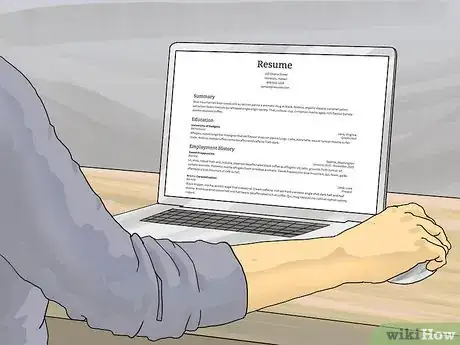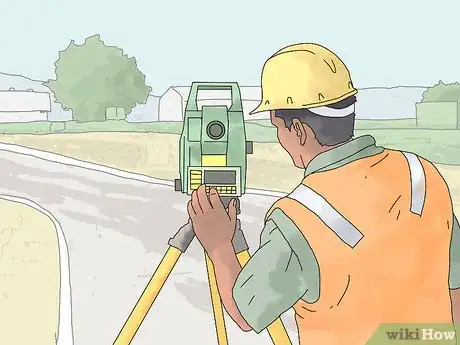This article was co-authored by wikiHow staff writer, Amy Bobinger. Amy Bobinger has been a writer and editor at wikiHow since 2017. She especially enjoys writing articles that help people overcome interpersonal hurdles but frequently covers a variety of subjects, including health and wellness, spirituality, gardening, and more. Amy graduated with a B.A. in English Lit from Mississippi College in 2011 and now lives in her hometown with her husband and two young sons.
There are 8 references cited in this article, which can be found at the bottom of the page.
wikiHow marks an article as reader-approved once it receives enough positive feedback. This article received 27 testimonials and 81% of readers who voted found it helpful, earning it our reader-approved status.
This article has been viewed 802,482 times.
Learn more...
Civil engineers are responsible for designing and building much of the infrastructure that helps societies function, like roadways, water pipes, and airports. If you want a challenging but rewarding job creating important structures, becoming a civil engineer could be the career of your dreams -- but figuring out where to start can feel like a daunting task. Luckily, wikiHow has done all the research for you! We've got all the most authoritative information here, including advice from The National Council of Examiners for Engineering and Surveying and the U.S. Bureau of Labor Statistics, to make sure you know exactly how to accomplish your goals.
Steps
Earning a Relevant Bachelor’s Degree
-
1Apply to colleges with an ABET-approved engineering program. In order to work as a civil engineer, you’ll need to have a bachelor’s degree. When you’re researching colleges, read the description of the engineering program to see if it’s accredited by ABET, formerly the Accreditation Board for Engineering and Technology. You must complete an accredited program in order to be eligible to take the engineering licensure exams required to become a licensed engineer.[1]
- If you can't find the information online, call the engineering department of the school and ask.
-
2Enlist in a military academy if you want to work for the armed forces. Joining the military can be a great way to get an education, especially if you can’t afford to pay for college yourself. When you enlist in a military academy to study engineering, you will be trained to build and repair infrastructure at home as well as at military bases overseas.[2]Advertisement
-
3Major in civil engineering or civil engineering technology. Since civil engineering is a unique blend of disciplines, it’s best to find a school which offers a program specifically tailored to that field. Earning your bachelor’s degree in civil engineering or civil engineering technology will help you land a relevant internship as well as a position as as Engineer in Training (EIT) after college.[3]
-
4Choose electives that will build your engineering knowledge. If courses like geology, physics, computer-aided drafting (CAD), and chemistry are not included in the required curriculum of your engineering program, take them as electives. Having a solid knowledge in these subjects will be useful as you start to take on large-scale projects in the real world, so study your lecture notes and textbooks for these classes as diligently as you do your required coursework.[4]
- Talk to your advisor about the different electives that are available within your major. They will likely be able to recommend the classes that will be most useful in your career.
-
5Apply for a civil engineering internship while you’re still in school. Some civil engineering programs will require a semester-long internship as part of your education. If this is the case, your advisor or program head will be able to help you through the internship application process. If your school does not require this, consider checking job boards online to try to find a summer-long engineering internship in your area.[5]
-
6Choose a concentration if you want to narrow your focus. A civil engineering degree is a broad area of study. If you would like to focus on one facet of civil engineering, consider choosing a concentration. There are a number of options for concentrations, including construction engineering, structural engineering, and geotechnical engineering. These usually require an additional 12-18 credit hours which cover topics specific to the specialty. You might even be able to get your internship in an area related to your concentration.[6]
Passing the Engineering Exams
-
1Prepare for both the the FE and PE exams with NCEES prep materials. When you're preparing for your licensing exams, you should take advantage of the prep materials offered by NCEES, the same company which administers the exams. NCEES offers practice exams that you can take to become familiar with the format of the exam. They also provide copies of their handbooks, which you will be able to reference during the exams.[7]
-
2Give yourself at least 3 months to study for each exam. Take at least 3 months to prepare for the test by taking practice exams and reviewing the handbook. Aim to study for 1-2 hours a day every day leading up to the exam. You may find that you need less time to prepare for the FE exam, since you'll be freshly out of school, but you may need as much as 6 months of study to prepare for the PE exam.
-
3Take sample tests to help you study for the FE and PE exams. Depending on your field of study, the hardest part of the FE and PE exams is usually the general knowledge section, since this tests a broad range of subjects you might not be as familiar with. For example, an electrical engineer might not have as much knowledge about beams. Practice exams can help you identify the areas you might struggle with during the test.
-
4Take the Fundamentals of Engineering (FE) exam. After you graduate, you should take the Fundamentals of Engineering (FE) exam. This is the first step in becoming a licensed engineer, regardless of your field of study. The FE exam is administered by the National Council of Examiners for Engineering and Surveying (NCEES). It’s an open-book, multiple choice exam that is about 8 hours long and covers basic and advanced engineering principles.[8]
- To prepare for the FE exam, sign up for a review course and take sample tests online. Since you will be able to use your book during the test, get a copy of the NCEES handbook and become familiar with its contents. This will help you easily access the information you need during the test.[9]
-
5Pass the Principles and Practice of Engineering (PE) exam. Once you’ve completed 4 years of field experience, you’ll need to take the Principles and Practice of Engineering (PE) Civil exam. This is an 8-hour open-book exam with 80 questions related to advanced civil engineering concepts.The PE Civil exam is offered twice a year.
- The PE Civil exam includes 2 parts. The first part, administered in the morning, includes questions from the 5 main areas of practice in civil engineering. These include construction, geotechnical engineering, structural engineering, transportation, and water resources and environmental engineering. The second part of the test, given in the afternoon, focuses on a single one of these 5 areas of practice, selected by you when you register for the exam.[10]
- The PE exam is necessary to become a licensed professional engineer. The test is designed to be challenging, but not impossible to pass, so take preparation seriously.
Landing an Entry-Level Job
-
1Create a resume before you start applying for jobs. Make a resume that lists your relevant work history, including your internship information if you participated in one. Have a section about your engineering education and another listing your skills and qualifications, as well as your score on the FE exam.
-
2Apply for entry-level jobs under a licensed professional engineer. After you complete your bachelor’s degree and pass the FE exam, you will be an Engineer in Training, or EIT. As an EIT, you can look for a position under a licensed professional engineer. You will need at least 4 years of experience as an EIT before you can take the PE exam to become a licensed engineer yourself.[11]
- Use job boards to search for entry-level civil engineering jobs like “Junior Civil Engineer” or “Engineering Aide.” Start by searching for jobs close to you, then expand your search to areas where you would be willing to move. Submit your resume to the jobs you're interested in.
-
3Look for jobs in the specialty you want to work in. If you're hoping to build roadways, for instance, you might search for entry-level engineering jobs with your state's Department of Transportation. If your potential employers see that you're passionate about your career path, they'll be more likely to consider you for the position.[12]
-
4Ask your former professors or employers for recommendation letters. Most candidates for entry-level jobs in the engineering field have already undergone a lot of training before they get to the application process. Make the most of that training by asking your former professors, employers, or the people who hired you for your internship to write letters recommending you for a position.[13]
-
5Prepare for interviews by practicing interview questions. You might have to go on several interviews before you get hired, so take the time to prepare. To prepare for a job interview, write down a list of questions that you might be asked. You can find sample interview questions online, plus you should try to brainstorm a few that are specific to your field. Once you have your list of questions, practice the answers out loud. You can either have a friend ask you the questions or you can try this yourself in the mirror.
- One example interview question might be, "What are the major engineering projects you have worked on?"
- You might also be asked about engineering software you used in school or during an internship.
- You may be asked specific questions about your experience that might be relevant to the company, such as whether you participated in any projects building dams or working on a mine site.
Community Q&A
-
QuestionWhat subjects do I need to learn in the beginning?
 Community AnswerDo the following subjects to have a well-rounded and suitable background: Mathematics, design, science skills, technology, physics, economics, geography and geology.
Community AnswerDo the following subjects to have a well-rounded and suitable background: Mathematics, design, science skills, technology, physics, economics, geography and geology. -
QuestionWhat are the subjects needed for the books in step two?
 Community AnswerMathematics, design and technology, information technology and physics, with economics, geography, and geology also being of help.
Community AnswerMathematics, design and technology, information technology and physics, with economics, geography, and geology also being of help. -
QuestionWhat is a civil engineer?
 Community AnswerA civil engineer is an engineer who deals with the design, construction, and maintenance of the physical and naturally built environment. This includes things like: roads, bridges, canals, dams, and buildings.
Community AnswerA civil engineer is an engineer who deals with the design, construction, and maintenance of the physical and naturally built environment. This includes things like: roads, bridges, canals, dams, and buildings.
References
- ↑ https://www.bls.gov/ooh/architecture-and-engineering/civil-engineers.htm#tab-4
- ↑ https://todaysmilitary.com/working/careers/civil-engineers
- ↑ https://www.bls.gov/ooh/architecture-and-engineering/civil-engineers.htm#tab-4
- ↑ https://www.bls.gov/ooh/architecture-and-engineering/civil-engineers.htm#tab-4
- ↑ https://learn.org/articles/Civil_Engineering_5_Steps_to_Becoming_a_Civil_Engineer.html
- ↑ https://www.learnhowtobecome.org/engineering-careers/civil/
- ↑ https://ncees.org/exams/exam-preparation-materials/
- ↑ https://ncees.org/engineering/fe/
- ↑ https://ncees.org/engineering/fe/
- ↑ https://ncees.org/engineering/pe/civil/
- ↑ https://www.bls.gov/ooh/architecture-and-engineering/civil-engineers.htm#tab-4
- ↑ http://www.businessinsider.com/what-to-say-when-the-hiring-manager-asks-why-should-we-hire-you-2015-4
- ↑ https://learn.org/articles/Civil_Engineering_5_Steps_to_Becoming_a_Civil_Engineer.html
About This Article
If you want to become a civil engineer, get a bachelor’s degree in civil engineering or civil engineering technology from a college with an accredited engineering program. Alternately, you can enlist in a military academy, where you’ll get your education for free and then work for the armed forces. While you're in school, take classes in geology, physics, chemistry, and computer-aided drafting to help prepare you for the field. Try to get good grades in your classes and impress your professors so you can ask them for recommendations for internships and jobs. To learn how to prepare for the exams you have to take to become a civil engineer, scroll down!








































































